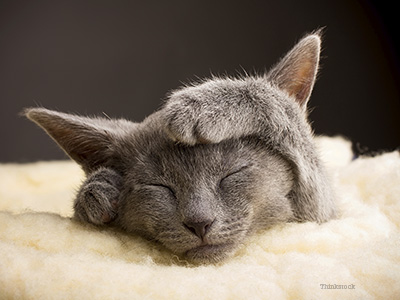Dr. Phil Zeltzman is a traveling, board-certified surgeon in Allentown, PA. His website is www.DrPhilZeltzman.com. He is the co-author of “Walk a Hound, Lose a Pound” (www.WalkaHound.com).
AJ Debiasse, a technician in Stroudsburg, PA, contributed to this article.

It’s tough for many of my clients to believe that their seemingly happy, healthy, lazy cat may be a ball of stress on the inside. Recognizing stress in cats may be difficult but it is always important.
Stress in cats not only reduces quality of life, but there is a link between stress and medical conditions, such as bladder diseases and behavior problems. But don't panic just yet. Small and easy changes can help minimize stress and promote happiness. This concept is called Environmental Enrichment.
Stress relief and litter boxes
Kitties eliminate not just because they have to, but also because it’s a way to claim what is theirs. You can avoid “peeing outside the box” with a few litter box rules.
Cats love cleanliness. The number of litter boxes should equal the number of household cats +1. Different cats prefer different litter types, so you may have to offer a “litter box buffet” of many different types of litter until you determine which type your cat uses consistently. Litter boxes should be scooped every day and washed weekly with mild dish detergent. Cats are very sensitive to smells. A strong cleaner smell may prevent your cat from using the litter box. The size of the litter box is similar to the rules of a puppy crate. It should be large enough for your cat to stand up and turn around.
Should it be opened or closed? That will depend on which your cat likes most. As far as the location goes, privacy and tranquility are key. Click here for more litter box tips.
Stress relief and scratching
Scratching is a natural behavior that helps cats leave their scent, shed, sharpen their nails and even helps them stretch. To prevent cats from choosing a not-so-ideal location, make sure your cats have a scratching post they like. If your kitty likes the couch leg, then try a vertical scratching post. If your cat likes to scratch the wood furniture, than try a wood log.
Stress relief and sleeping/resting
Cats do not like to be bothered while resting any more than people do. Make sure they have a quiet, cozy place to sleep. You can purchase different types of beds, but simple blankets or towels work just as well, and they can be easily washed.
Stress relief and playing
Most cats no longer need to hunt to eat, but their enjoyment to pounce on a moving target has not decreased. Furry mice toys, foil balls and tethered toys seem to be some of their favorites. It keeps them physically and mentally stimulated. Just be sure to pick up the toys after playing to decrease the risk of your cats eating something they shouldn’t.
Stress relief and perching
Cats are very curious. They need to know what is going on around them. Having a windowsill or a cat tree can help them feel secure while allowing them to survey their surroundings.
Stress relief and visual stimuli
Cats love to watch birds, fish, bugs etc. You can supply this free entertainment by making windowsills available, having a fish tank or even choosing a nature show on TV. This fights boredom. Try it; your cat may watch for hours.
Stress and feline appeasing pheromone
A pheromone is a chemical produced by an animal to change the behavior of other individuals of the same species. Cats make pheromones from glands located around the head, the lower back and the paws.
Scientists have found a way to make feline pheromone. You can now purchase sprays and diffusers that give off a calming scent to help ease stress in kitties, in any situation:
- At home
- In the carrier
- In the car
We all want our family felines to be healthy and happy. These seven simple changes can turn your hyper-stressed-out cat into a relaxed feline.
Questions to ask your veterinarian:
- Why does my cat not use the litter box?
- What can I do to decrease stress in my particular cat?
- Should I use the Feline Appeasing Pheromone?
If you have any questions or concerns, you should always visit or call your veterinarian -- they are your best resource to ensure the health and well-being of your pets.
